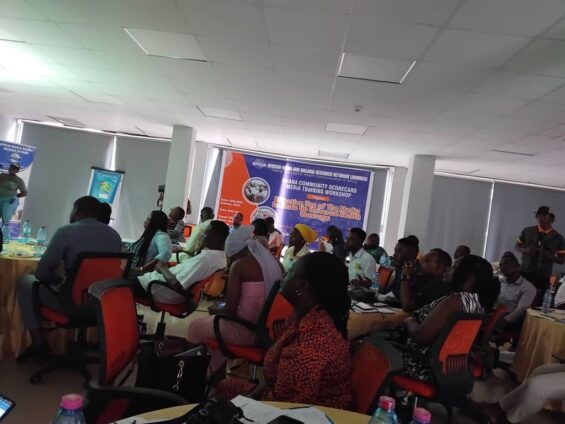To bring quality healthcare closer to communities, the Ghana Health Service (GHS) is implementing a transformative initiative called the "Network of Practice." This initiative aims to enhance the existing Community-Based Health Planning and Services (CHPS) system by connecting health facilities at the sub-district level to a central health centre.
The goal is to improve access to quality healthcare while reducing the overcrowding burden on district hospitals.
Dr Andrews Ayim, Deputy Director of Information, Monitoring, and Evaluation at GHS, shared insights about the Network of Practice during a recent workshop on the Community Scorecard, a program organized by the Africa Media and Malaria Research Network (AMMEREN), African Leaders Malaria Alliance (ALMA), and the Ministry of Health with funding support from Expertise France.
Addressing Healthcare Accessibility and Quality
Speaking on the urgent need to decentralize healthcare access, Dr Ayim explained that the CHPS compounds, which are the first points of healthcare for many, often have limited resources.

This can necessitate referrals to district hospitals for more complex cases, causing difficulties for patients, especially those with chronic conditions like hypertension. “An elderly patient with hypertension, for example, currently has to travel to the district hospital every month for medication refills. Through the Network of Practice, we aim to equip health centres at the sub-district level to provide these services, thus minimizing travel and ensuring patients have consistent access to care,” Dr Ayim remarked.
Under this system, each sub-district health facility will work in close coordination with a designated health centre that serves as a model. This model health centre will support nearby CHPS compounds with additional resources and expertise, ensuring a seamless transition of cases from CHPS compounds to the health centre and, if necessary, to district hospitals. Dr. Ayim emphasized that this will relieve pressure on district hospitals, which are often overcrowded, compromising the quality of care. “By empowering sub-district health centres, we can filter cases better, allowing district hospitals to focus on more severe cases while enhancing quality at every level,” he added.

Efficient Resource Sharing and Specialist Support
The Network of Practice, According to Dr Ayim also introduces a model of resource-sharing across facilities within the network. In situations where a particular facility has a specialist, their expertise can be extended to other connected facilities. “Even though we don’t have many specialists, the resources available within the network can be shared, enabling all facilities to benefit from the skills of these professionals,” Dr Ayim explained, stressing the importance of collaborative healthcare systems, especially in resource-limited settings.
Role of Journalists in Community Health Advocacy
The training workshop also underscored the role of journalists in bridging the gap between health systems and communities. Dr. Charity Binka, Executive Director of AMMEREN, highlighted that journalists play a crucial role in promoting universal health coverage, particularly as Ghana strives to meet its 2030 goal for health accessibility. “Journalists can bring balanced reporting that reflects both the communities' needs and the health systems’ challenges, fostering growth and improvement in healthcare delivery across Ghana,” Dr. Binka noted. She further urged journalists to avoid sensationalism and focus on stories that emphasize community health development.

The Community Scorecard Initiative
The Community Scorecard, which was a key focus of the workshop, allows communities to assess the performance of local health facilities, providing a direct feedback mechanism that the GHS can use to address shortcomings and improve services. “The scorecard offers a transparent, community-driven evaluation of health facilities, which journalists can report on to bridge understanding and encourage collaborative solutions,” Dr Ayim stated.
With such initiatives and the support of informed media reporting, Ghana is positioning itself to build a robust, community-centred healthcare system that improves lives at the grassroots. The introduction of the Network of Practice reflects GHS’s commitment to quality healthcare, and the active involvement of journalists promises to amplify its reach and impact across Ghana’s communities.

Latest Stories
-
Livestream: The manifesto debate on WASH and climate change
30 seconds -
Alan Kyerematen saddened by NDC and NPP’s neglect of Krofrom Market in the Ashanti Region
4 mins -
CSIR Executive Director urges farmers to adopt technology for improved farming
18 mins -
Football Impact Africa’s Ghetto Love Initiative inspires change in Teshie
29 mins -
Peter Toobu calls for tighter border security over uncovered weapons at Tema Port
31 mins -
Gov’t has failed its commitment to IPPs – Ablakwa
35 mins -
Sell Chrome to end search monopoly, Google told
47 mins -
KATH to install seven new dialysis machines by end of November
50 mins -
Walewale: Police confiscate 37 bags of cocoa beans suspected of being smuggled out of Ghana
1 hour -
‘Expired’ Rice Scandal: FDA confirms rice was safe for consumption after rigorous lab tests
1 hour -
Many women have experienced intimate partner violence – Angela Dwamena Aboagye
1 hour -
Power challenges persist due to government’s mismanagement of revenues – Okudzeto Ablakwa
2 hours -
Jordan Ayew injury not as bad as feared – Leicester City boss
2 hours -
Stonebwoy heads to North America for UP & RUNNIN6 tour
2 hours -
FDA explains extension of best-before date for ‘expired’ rice
2 hours

